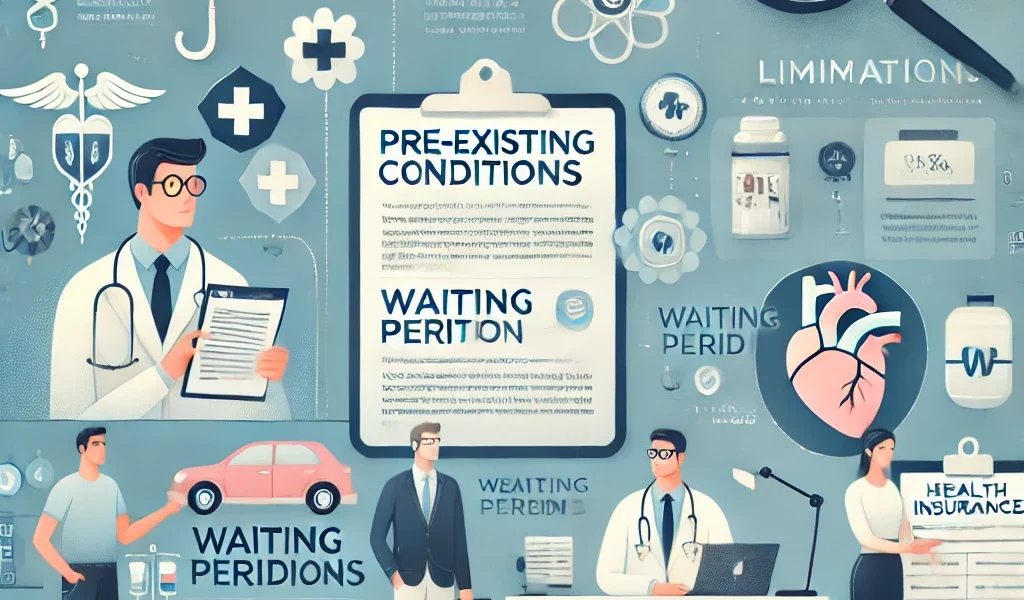Health insurance claims can be complex, especially when pre-existing conditions come into play. Understanding how they impact your claims process is crucial to ensuring you get the coverage you deserve. This guide will help you navigate the challenges associated with pre-existing conditions and provide actionable tips for a smoother claims experience.
What Are Pre-Existing Conditions?
A pre-existing condition is any illness, injury, or health condition that existed before you applied for a health insurance policy. These may include chronic diseases such as diabetes, asthma, heart disease, or prior surgeries and treatments.
Examples of Pre-Existing Conditions:
- Diabetes
- Hypertension
- Asthma
- Arthritis
- Cancer
- Heart disease
- Mental health disorders
How Do Pre-Existing Conditions Affect Your Insurance Claim?
Insurance providers assess risk when underwriting policies. If you have a pre-existing condition, insurers may impose certain limitations:
1. Waiting Periods
Many health insurance policies include a waiting period before covering pre-existing conditions. This can range from a few months to several years, depending on the insurer and policy type.
2. Higher Premiums
Since pre-existing conditions may require frequent medical attention, insurers often charge higher premiums to offset the associated risk.
3. Exclusions and Limitations
Some policies may exclude specific treatments related to pre-existing conditions. For instance, if you have a history of knee surgery, an insurer may not cover future treatments for that knee.
4. Medical Underwriting
Insurers may assess your medical history before issuing a policy. In some cases, they may deny coverage or offer modified terms.
Tips to Navigate Health Insurance Claims with Pre-Existing Conditions
To ensure a smooth claims process, follow these essential tips:
1. Disclose All Health Conditions Honestly
Failing to disclose pre-existing conditions can result in claim denials. Always provide accurate medical history when purchasing a policy.
2. Understand Your Policy’s Terms
Read the fine print to check for waiting periods, exclusions, and premium costs. This will prevent surprises when you file a claim.
3. Check for Government Regulations
In many countries, regulations protect policyholders with pre-existing conditions. For example:
- Under the Affordable Care Act (ACA) in the U.S., insurers cannot deny coverage due to pre-existing conditions.
- Some countries have specific rules requiring insurers to cover chronic illnesses after a set waiting period.
4. Opt for Policies with Shorter Waiting Periods
Compare different insurance providers and choose one that offers minimal waiting periods for pre-existing conditions.
5. Maintain Continuous Coverage
Gaps in coverage can make it harder to get insured for pre-existing conditions in the future. Ensure that your policy remains active.
6. Submit Proper Documentation
When filing a claim, provide complete medical records, prescriptions, and doctor’s reports to avoid delays in claim settlement.
What to Do If Your Claim Is Denied Due to a Pre-Existing Condition?
If your health insurance claim is denied because of a pre-existing condition, consider these steps:
1. Review the Denial Letter
Carefully read the insurer’s explanation to understand why your claim was rejected.
2. Contact Your Insurer
Discuss the denial with your insurer’s customer service or claims department. Sometimes, simple clarifications can resolve issues.
3. Appeal the Decision
Most insurers have an appeal process where you can challenge a denied claim by submitting additional medical evidence.
4. Seek Legal or Regulatory Help
If your insurer unfairly denies your claim, you can escalate the issue to the insurance regulatory body in your country.
Conclusion
Understanding how pre-existing conditions impact health insurance claims is crucial for getting the coverage you need. By staying informed, choosing the right policy, and following best practices, you can ensure a hassle-free claims experience. Always review your policy, disclose medical conditions honestly, and know your rights under insurance laws to protect yourself from unnecessary claim denials.




